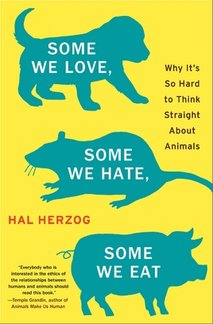
15 Sep 2010 01:34:15
"Some We Love, Some We Hate, Some We Eat: Why It's So Hard to Think Straight About Animals" by Hal Herzog: Consider the cockfighter. Pampered with high-end feed and plenty of room to strut in the sun, these roosters might even get regular massages before the day they are fitted with slashing spurs and thrown into a pit for a barbaric fight to the death.
Now consider the chicken on your plate. There's a good chance it never saw the sun or sky but was jammed in some dark coop stinking of ammonia. It may have spent much of its short life in piles of manure because its weak legs could barely support its freakishly plumped body. In the end, it was snatched up, crated, hung upside down and beheaded.
Both fates are gruesome. But really, which abused chicken suffered less: the one involved in an illegal activity or the one that was part of a common — albeit increasingly criticized — agricultural practice?
Hal Herzog doesn't approve of either activity, but his book, "Some We Love, Some We Hate, Some We Eat: Why It's So Hard to Think Straight About Animals," raises the question of why one act can lead to prison and the other to profit. It's a big understatement to say humanity's interactions with animals is inconsistent, and this book explores those quirks and possible reasons behind them. In Herzog's words, he wants to examine why dogs can eat dinner at the table in some countries, but be eaten for dinner in others.
It's a fun read, though readers expecting a clever, new presentation of facts like in a Malcolm Gladwell book might be disappointed. Herzog, the earnest psychology professor, is interested in explaining what researchers know — and don't know — about the subject from every angle.
He also knows an interesting factoid when he sees one. For instance, Americans have gone from eating a half-pound of chicken a year during the Hoover administration to nearly 90 pounds a year now. Adolf Hitler signed the world's most comprehensive animal protection legislation at the time in 1933. And since spay and neuter programs are much more successful in the Northeast than the South, maybe 90 percent of adopted dogs in the Northeast come from the South. Herzog describes Interstate 95 along the East Coast as the "underground dog railway to the New York suburbs."
Some of Herzog's anecdotes are too common to be all that interesting. Who doesn't know of an elderly person who loves the companionship of a cat, or people who treat their dogs like royalty?
Now consider the chicken on your plate. There's a good chance it never saw the sun or sky but was jammed in some dark coop stinking of ammonia. It may have spent much of its short life in piles of manure because its weak legs could barely support its freakishly plumped body. In the end, it was snatched up, crated, hung upside down and beheaded.
Both fates are gruesome. But really, which abused chicken suffered less: the one involved in an illegal activity or the one that was part of a common — albeit increasingly criticized — agricultural practice?
Hal Herzog doesn't approve of either activity, but his book, "Some We Love, Some We Hate, Some We Eat: Why It's So Hard to Think Straight About Animals," raises the question of why one act can lead to prison and the other to profit. It's a big understatement to say humanity's interactions with animals is inconsistent, and this book explores those quirks and possible reasons behind them. In Herzog's words, he wants to examine why dogs can eat dinner at the table in some countries, but be eaten for dinner in others.
It's a fun read, though readers expecting a clever, new presentation of facts like in a Malcolm Gladwell book might be disappointed. Herzog, the earnest psychology professor, is interested in explaining what researchers know — and don't know — about the subject from every angle.
He also knows an interesting factoid when he sees one. For instance, Americans have gone from eating a half-pound of chicken a year during the Hoover administration to nearly 90 pounds a year now. Adolf Hitler signed the world's most comprehensive animal protection legislation at the time in 1933. And since spay and neuter programs are much more successful in the Northeast than the South, maybe 90 percent of adopted dogs in the Northeast come from the South. Herzog describes Interstate 95 along the East Coast as the "underground dog railway to the New York suburbs."
Some of Herzog's anecdotes are too common to be all that interesting. Who doesn't know of an elderly person who loves the companionship of a cat, or people who treat their dogs like royalty?

